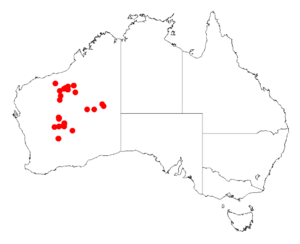Balsam wattle facts for kids
Quick facts for kids Balsam wattle |
|
|---|---|
| Scientific classification | |
| Genus: |
Acacia
|
| Species: |
balsamea
|
 |
|
| Acacia balsamea occurrence data from Australasian Virtual Herbarium | |
| Synonyms | |
|
Racosperma balsameum Pedley |
|
The balsam wattle, scientifically known as Acacia balsamea, is a special type of shrub. It is part of the big Acacia family, which includes many different wattle plants found mostly in Australia. This plant gets its name "balsam" because its leaves have a nice, strong smell.
About the Balsam Wattle
What Does It Look Like?
The balsam wattle is a rounded shrub that usually grows between 1 to 2.5 metres (3 to 8 ft) tall. It has branches that stand up straight and are a bit yellowish.
Its leaves, called phyllodes, are a unique khaki green color. They stand upright and are mostly straight or slightly curved. These leaves are quite long, about 8 to 13 centimetres (3 to 5 in), but very thin, only about 1 to 1.2 millimetres (0.039 to 0.047 in) across. They also have a pleasant, strong scent.
When the balsam wattle flowers, it has small, round or oval-shaped flower-heads. Each of these flower-heads contains about 21 tiny flowers. After flowering, the plant produces woody seed pods. These pods are straight or slightly curved and can be up to 12 cm (5 in) long. They are narrow, only about 3 to 4 mm (0.118 to 0.157 in) wide. Inside the pods, you'll find dull brown seeds that are shaped like an oval and are about 5 mm (0.197 in) long.
Where Does It Grow?
The balsam wattle is native to Western Australia. You can find it in the Goldfields and Pilbara regions. It grows in scattered areas, from places like Marble Bar in the west, stretching east towards Leinster and into the Gibson Desert.
This shrub prefers to grow in rocky, granite soils, often found on stony hills. It is usually part of tall, open shrubland areas. You might often see it growing near another common wattle called Acacia aneura.
Who Discovered It?
The balsam wattle was first officially described by two botanists, Richard Sumner Cowan and Bruce Maslin. They wrote about it in 1999 in a scientific journal called Nuytsia. Their detailed description helped other scientists learn about this new plant.
For a short time in 2003, another botanist named Leslie Pedley reclassified it. He gave it the name Racosperma balsameum. However, by 2006, it was changed back to its original name, Acacia balsamea, which is what it is called today.

